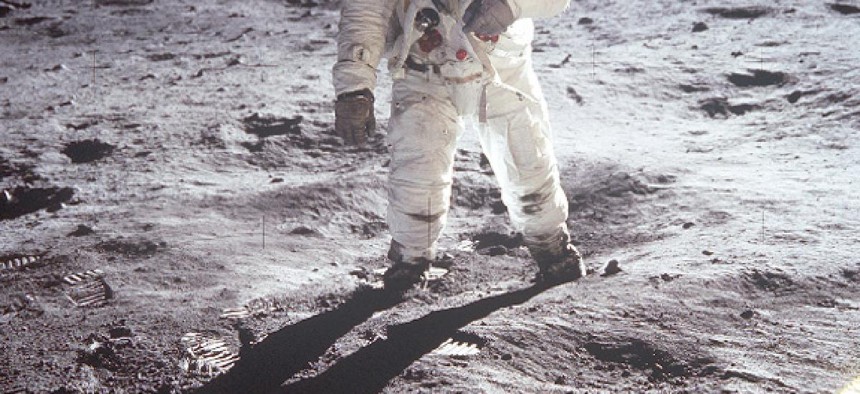
NASA
Newt Gingrich’s space plan may not be quite as grandiose as he thinks.
In characteristic fashion, Gingrich compared his ideas for a moon base to acts by Abraham Lincoln, the Wright brothers, and John F. Kennedy, but the lofty goal was not far beyond one established by a much more contemporary leader: George W. Bush.
During a campaign speech in Florida on Wednesday, Gingrich put his own unique spin on his promise to have a moon base by the end of his second term as president: He called for a solely American colony with the potential to become a 51st state, and he proposed a series of contests to encourage private industry to pay for it.
The U.S. is no closer to having a colony on the moon than it was when the last astronauts left in 1972, but it’s not for a lack of thinking about it. Until 2010, a moon base was exactly what NASA was working toward.
In 2004, President Bush, who compared his plan to the voyages of Lewis and Clark, proposed returning to the moon by 2020 (which, coincidentally, would roughly coincide with the end of a two-term Gingrich presidency), calling it a “logical step toward further progress and achievement.”
“With the experience and knowledge gained on the moon, we will then be ready to take the next steps of space exploration: human missions to Mars and to worlds beyond,” Bush said in a 2004 speech at NASA headquarters in Washington.
Bush’s thinking was based not only on the scientific benefits of such a base, but on what he saw as the cost savings of having a presence on the moon. Bush planned to pay for the effort with savings from other programs, such as the space shuttle, which were ending.
And Bush's plan was more than just words. His speech helped lead to the official launch of the Constellation program, which was developed after the deadly 2003 loss of the shuttle Columbia. But costs soared, and the timeline became uncertain.
Finally, six years and more than $9 billion later, Bush’s plan to “gain a new foothold on the moon” came face to face with the reality of government budgets, and a new Democratic administration. In a speech of his own in 2010, President Obama shelved the moon mission in favor of robotic missions, with an eye on eventual travel to Mars.
Republicans have criticized that decision, as well as the end of the shuttle program (a decision actually made by Bush), but the desire to confirm America’s dominance in space has been undermined by efforts to slash government spending.
As Elliot Pulham, CEO of the Space Foundation, has pointed out, “The mastery of space has always carried with it a not-so-subtle message to friend and foe: This is what we are capable of…. You do not want to challenge us.”
That’s a message that resonates with conservatives who have blasted Obama’s perceived retreat from space. And that’s a message that Gingrich repeated on Wednesday.
"I am sick of being told we have to be timid and I'm sick of being told we have to be limited to technologies that are 50 years old," he told the Florida crowd. "I accept the charge that I am American and Americans are instinctively grandiose because we believe in a bigger future."
Even Gingrich’s "lean and aggressive" proposal for a series of government incentives and prizes to help drum up private investment in his space programs has companionship in Obama’s more-limited efforts to increase private-sector resources to send astronauts to the International Space Station.
In Congress, traditional supporters from states like Florida and Alabama have been divided in their support for more funding. Meanwhile, last year Obama’s budget proposals froze NASA’s budget at 2010 levels while House Republicans called for up to $379 million in cuts.
While any plans to expand space programs play well in Florida, hard-hit by the end of the shuttle program, it’s not clear that there is the national commitment necessary to put humans on the moon in any particularly quick fashion. In Washington and the country at large, a President Gingrich could find himself hampered by the same competing interests that have left NASA in limbo.
NEXT STORY: Tech Hiring






